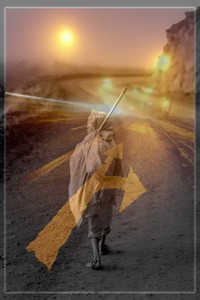Blog Away
H considered my question carefully through his thousand mile stare I thought had dissipated unanswered and only brooded over through the thick cigarette smoke that hung suspended at our favorite Ethiopian restaurant, but thankfully returned in typical quizzical look, yet shrouded in usual crypt. He asked, “how can I recall my bullets once I fire them?”
Conversations with H often take on a Socratic repartee where answers are buried deep in parables. His reasoning struck a nerve and I took a mouthful of the pale ale in front me; the Yeungling went down in nervous gulps. I gave it my best shot: “I guess you don’t want to write things you will regret?” He slowly nodded, leaving us both to our thoughts and to our drinks and to the sorry excuse for a band and a crooner who was doing a terrific job mangling Alemayehu Eshete’s Man yehon Telik Sew?
H struck a nerve that evening because I have always believed opining about Ethiopian politics comes with tremendous responsibility. Concern about having to eat my words figures in every posting and I know several bloggers feel that way. To the extent possible, I make use of the bright talent Ethiopia has produced—close friends and family members who carefully vet every posting on Carpe Diem Ethiopia. Ergo the pronouns “we” and “us” in several of “our” postings.
Each posting creates both a friend and an enemy. Some of the few viscous e-mails I’ve received from EPRDF supporters in the past year is a constant reminder that those who hate are amongst us (do keep them coming, it tell me I’m doing something right). Other criticism and comments I’ve received remind me of Benjamin Franklin’s admonishment that “our critics are our friends, [for] they show us our faults.”
Around this time last year, I started writing in the heels of a personal loss but that was rendered miniscule compared to the wanton destruction of innocent life in Ethiopia in the aftermath of the May 15, 2005 elections. I watched in utter disbelief as the EPRDF, under the glare of the word’s cameras, defrauded an election, and then went on to kill, permanently maim, detain, and lie to silence a people’s voice. I watched in shock as the Coalition for Unity and Democracy (CUD), the party I believed best articulated Ethiopia’s hopes, dreams, and challenges was systematically turned into a treacherous organization bent on usurping power through violent means; its leaders made out to be agents of war and condemned to indefinite incarceration. I also watched in shock as my favorite politician, Dr. Berhanu Nega was turned into a pariah by both the EPRDF and unfortunately, by members of his own party. (I continue to believe Dr. Berhanu is an amazingly brilliant man who, if he survives the EPRDF’s dungeons, will one day lead Ethiopia toward a democratic path). I also watched in amazement as Lidetu Ayalew, the fiery politician who inspired millions of voters to defy the EPRDF, turn.
In the end, the arguments of the EPRDF’s strongest critics of have proved to be true. The party was never prepared to relinquish power. Ethiopundit’s The World is Yours series gives us an alpha-omega analysis of the EPRDF’s addiction to power and its willingness to retain it at all cost. The ruling party's single most error is its belief that the winds of change will be tamed by its killing of dissenters, in its detention centers, in its kangaroo courts, and by the silencing of the private press.
In October 2005, negotiations between the ruling party and the opposition broke down, and in November 2005, the EPRDF launched its final assault on a plebiscite to end rule by dictat and to move the nation toward a tolerant and just society. Its refusal to do so created this and with a few exceptions, almost every blog on the index list to right under “Blogs on Ethiopia and Ethiopians.” Each link tells a story of desperation and anger, but most important, love for Ethiopia and her good people. But we need more blogs; each blog that has appeared in the past year has offered a new perspective; an idea we hadn’t explored, a corner we never turned, and an angle we missed. Check this link on how to create a blog. (Always remember to use routers, anonymous proxy services, and to never blog from the office). So blog away and if you must eventually eat your words, then you must. Such is life.
I am grateful to all those who’ve linked this blog in theirs, especially to the first five: the aggregator, Andrew Heavens, Tazabi & Yagerlig, Yekolotemari, and Eth4life. I am also thankful to TC who encouraged this blog—I yet have to find another Ethiopian who loves his country as much as you do. We will get there, brother.
As long as Ethiopians live under tyranny, we will keep blogging. And we will do so without fear, respite, and loathing.


